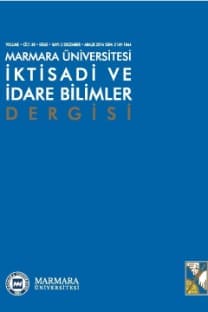IR THEORY AS AN 'ARELIGIOUS' RESEARCH FIELD: THE SOURCES OF AND CRITICAL PROSPECTS TO OVERCOME THE INTELLECTUAL FAILURE
BİR ENTELEKTÜEL BAŞARISIZLIĞIN KÖKENLERİ VE MUHTEMEL ELEŞTİREL ÇÖZÜMLERİ: 'DİNDIŞI' BİR ARAŞTIRMA ALANI OLARAK ULUSLARARASI İLİŞKİLER KURAMI
___
- ASHLEY, Richard K. "Political Realism and Human Interest", International Studies Quarterly, 1981, 25, p. 204-236.
- BULL, Hedley, "International Theory: The Case for a Classical Approach", World Politics, 1966, 18(3), p. 361-377.
- BURTT, E. A., The Metaphysical Foundations of the Modern Science, New York, Dover Publications, 2003.
- COX, Robert, "Social Forces, States and World Orders: Beyond International Relations Theory", Millennium: Journal of International Studies, 1981, 10(2), p. 126-55.
- FOX, Jonathan, The Multiple Impacts of Religion on International Relations: Perceptions and Reality in Religion and International Relations, 2006, http://www.cairn-int.info/article-E_PE_064_1059-- the-multiple-impacts-of-religion-on.htm (03.09.2015).
- FOX, Jonathan and Shmuel Sandler, Bringing Religion into International Relations, New York, Palgrave- Macmillan, 2004.
- GÜNER, Serdar, "Religion and Preferences: A Decision-theoretic Explanation of Turkey's New Foreign Policy", Foreign Policy Analysis, 2012, 8(3): 217-230.
- GRIFFITHS, M., S. C. Roach, and M. S. Solomon, Fifty Key Thinkers in International Relations, London, Routledge, 2009.
- HABERMAS, Jurgen, Knowledge and Human Interests, Boston MA, Beacon Press, 1971.
- HABERMAS, Jurgen, Moral Consciousness and communicative Action, Cambridge, Polity, 1990.
- HABERMAS, Jurgen, Justification and Application: Remarks on Discourse Ethics, Cambridge, MIT Press, 2001.
- HANNAM, James, God's Philosophers: How the Medieval World Laid the Foundations of the Modern Science, London, Icon Books, 2009.
- HURD E. S., "The Political Authority of Secularism in International Relations", European Journal of International Relations, 2004, 10(2): p. 235-62.
- HUTCHINGS, Kimberly, "Happy Anniversary Time and Critique in International Relations Theory", Review of International Studies, 2007, 33, p. 71-89.
- HOBSON, John M. "Is critical theory always for the white west and western imperialism? Beyond Westphalian towards a post-racist critical IR", Review of International Studies, 2007, 33, p. 91- 116.
- KAPLAN, Morton A. "The New Great Debate: Traditionalism vs. Science in International Relations", World Politics, 1966, 19(1), p. 1-20.
- MILL, John Stuart, Auguste Comte and Positivism, London, N. Trübner, 1865.
- PHILPOTT, D. "The Challenge of September 11 to Secularism in International Relations", World Politics, 2002, 55(1), p.66-95.
- LAUSTSEN C. B. and Ole Waever, "In Defense of Religion: Sacred referent Objects for Securitization", Millennium, 2000, 29(3), p. 705-739.
- LINKLATER, Andrew, "The Achievements of Critical Theory", International Theory, Eds: S. Smith, K. Booth, and M. Zalewski, Cambridge, Cambridge University Press, 1996, p. 279-298.
- RENGGER, Nicholas and Ben Thirkel-White, "Still Critical After all These Years? The Past the Present and Future of Critical Theory in International Relations", Review of International Studies, 2007, 33, p. 3-24.
- SANDAL, Nükhet Ahu and Jonathan Fox, Religion in International Relations Theory: Interactions and Possibilities, New York, Routledge, 2013.
- SANDAL, Nükhet Ahu and Patrick James, "Religion and International Relations Theory: Towards a Mutual Understanding", European Journal of International Relations, 2011, 17(1), p. 3-25.
- SNYDER, Jack, Religion and International Relations Theory, New York, Columbia University Press, 2012.
- ISSN: 1300-7262
- Yayın Aralığı: 2
- Başlangıç: 1984
- Yayıncı: Marmara Üniversitesi
TÜRKİYE'DE İNTERNETİ KİMLER, NE İÇİN KULLANIYOR?
CAPITAL STRUCTURE AND FIRM PERFORMANCE: AN APPLICATION ON MANUFACTURING INDUSTRY
ESTIMATION OF THE AIR QUALITY TRENDS IN ISTANBUL
TÜRKİYE'NİN İMALAT SANAYİ SEKTÖRÜNÜN ULUSLARARASI REKABET GÜCÜ ANALİZİ
DOES SUSTAINABLE DEVELOPMENT MAKE GOOD STRATEGIES FOR CORPORATE ACTORS?
EGO STATES IN BRAND-CONSUMER TRANSACTIONS
Sema Kurtuluş, Taşkın Dirsehan
TÜRKİYE’NİN İMALAT SANAYİ SEKTÖRÜNÜN ULUSLARARASI REKABET GÜCÜ ANALİZİ
